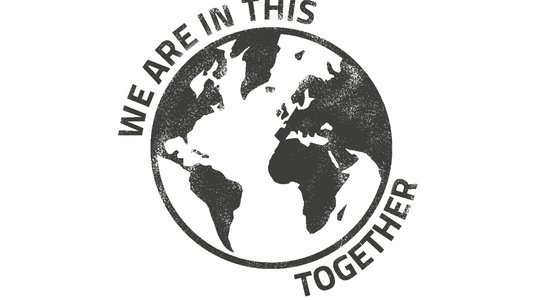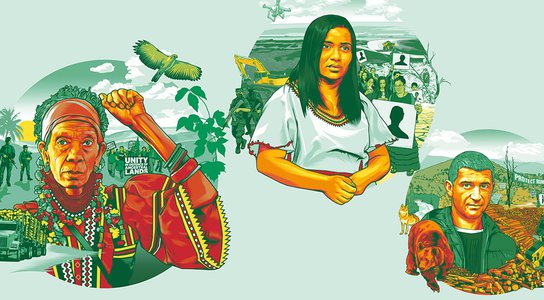Protecting the environment has become even more dangerous during the COVID-19 pandemic. Land and environmental defenders across the globe already face killings, threats, harassment and criminalisation for peacefully protecting their homes and our planet. In 2019, 212 environmental activists were murdered around the world – the highest number of killings that Global Witness has ever recorded in a single year. But this year, COVID-19 has made their situation even more precarious – and urgent action is needed.
Indigenous communities especially affected by COVID-19
According to the UN, discrimination and lack of access to healthcare means indigenous communities are particularly vulnerable to the spread of diseases and infections such as COVID-19.
In Brazil, at least 22,300 indigenous people have been infected while 633 have died, according to Brazil's main indigenous federation Articulação dos Povos Indígenas do Brasil (APIB). Coronavirus has caused the death of prominent indigenous elders and leaders in the country, such as Paulinho Paiakan, a Kayapó leader who opposed the Belo Monte dam, which would displace 20,000 and severely damage the aquatic ecosystem in the area. The case has gained international prominence with celebrities like Sting speaking out to support communities.
Each loss of life can mean loss of vital traditional knowledge. There have been media reports of medical aid not reaching remote indigenous communities and people resorting to travel long distances to receive treatment.
"Nobody came to help the community in the time we needed it the most. Almost the entire community fell sick [with symptoms similar to COVID-19]. I can't tell you what the disease was, but it happened at a time when we didn't expect it," said Chief Pedro dos Santos, leader of the "Park of Indigenous Nations" community, of Mura indigenous ethnicity.
"We have to preserve our community, preserve our land, preserve our forest, and remain in that isolation, we have to remain isolated until this disease is over, because it's dangerous," said Megaron Txucarramae, indigenous leader, Guardian of the flame for chief Raoni and for the Kayapo people.
In Colombia, which recorded the highest number of killings of land and environmental defenders in 2019, Angelica Ortiz, a leader with Fuerza de Mujeres Wayuu, a movement protesting against mining projects, reported loss of leaders to Coronavirus, increased threats, and slow response of relief funds for communities affected by the pandemic. “We are in the midst of crossfire, amidst the strategies that armed paramilitary groups are developing to attack. We face harsh realities, because we don’t know who to turn to while the murder of leaders and defenders has become a natural thing in Colombia. The government is not interested [in] what is happening with us as defenders.”
Increased threats and limitations to civil liberties
In some countries, governments have used the pandemic as an excuse to restrict land and environmental defenders’ freedoms, such as the right to protest or freedom of speech. This has made it very difficult for defenders to continue their work in standing up to destructive extractive industries and other environmentally damaging projects.
Rius Valle, an indigenous defender speaking out against a mining project in the Philippines, said, “During the pandemic, the attacks never stopped but even got worse. In fact, in the three-month lockdown in the Philippines, we have recorded 16 incidents of threat, harassment, and intimidation to the students and parents, affecting 133 individuals… It's very challenging, firstly, as much as we want to go out and protest against these attacks, we can't. We are confined.”
“Given the pandemic lockdown with the already limited space we have as activists we see bigger challenges that face us,” said Jaybee Garganera, the National Coordinator of environmental and human rights coalition Alyansa Tigil Mina (Alliance Against Mining – ATM) in the Philippines.
In the Philippines – the second deadliest country for environmental activists – defenders already face silencing measures such the Anti-Terror Bill, which can be used to label land and environmental defenders as communist insurgents and terrorists, leading to a high threat of arrest. Jaybee reports how the government has also used the pandemic to introduce even more restrictive measures, and limits to the freedom to associate, freedom of speech, or freedom of assembly. What’s more, extractive industries have seemingly been allowed to continue to operate despite the pandemic.
“The outbreak of [the] Coronavirus pandemic has been used as a Trojan horse to really push for more destructive and extractive big business in the country under the guise of an economic stimulus for the recovery of the country from the economic impacts of the pandemic,” said Jaybee.
Victoria Tauli-Corpuz, indigenous leader from the Philippines and former United Nations Special Rapporteur on the Rights of Indigenous Peoples, has also expressed concern that governments and businesses are using the pandemic to continue land grabs and human rights violations against indigenous communities. She said, “Environmental regulations are being lifted in places like Indonesia and Brazil. And in Kenya and Uganda, there has been more land grabbing.”
Positive actions against the odds
The right to protest and other civil liberties has been suspended in many parts of the world. Civil society space to speak out against environmental and human rights abuses has shrunk. Yet, land and environmental defenders persist in their actions and have adapted to the current climate.
Many defenders have moved their activities online. The Environmental Watch on the North Caucasus (EWNC), a Russian non-governmental organisation that investigates environmental abuses such as illegal logging, have had to adapt their investigations and public awareness campaigns.
“We could no longer run offline investigations on sites or talk to the general public. However, we’ve been emphasising our work on social media and analytical work (collecting stats, etc.),” shared Aleksandr Savelyev, an EWNC member.
Similarly, Fridays for Future climate strikers have focused on online campaigning to keep conversation going about the climate crisis, and Mila*, a youth climate activist in Russia, has said new projects and partnerships have even flourished. “Everything moved online with digital strikes, and partnerships where large environmental organisations began to thrive,” said Mila. “We launched a project with Greenpeace, Talks for Future, consisting of fortnightly lectures and webinars covering a range of topics.”
Indigenous defenders in the Philippines spoke out against the heavy-handed Anti-Terror Bill by joining a rally against it, while being sure to wear protective equipment such as face masks. They also continued community farming activities with young people, Valle said, to “keep the spirit of courage alive” among the community despite the lockdown.
“Despite the threats, we still joined the rally against the [Anti-Terror Bill], said Rius Valle, an indigenous defender who also volunteers with of the Save our Schools Network, Philippines, which works to preserve indigenous schools. “These are our attempts to show that the pandemic will never stop us. Neither the government nor this pandemic can silence us to express our protests. We think, the commitment to continue is the most important thing right now, because this is not just our fight or these children’s, this is a fight of the whole world.”
Many civil liberties and environmental campaigning groups have called for the right to protest and other civil liberties to be preserved in future. This call is absolutely vital for land and environmental defenders, who are protecting the environment and halting climate breakdown. Yet they are increasingly threatened, attacked and silenced. Unless civil society space for legitimate protest is protected, there can be no climate justice.
We stand with environmental and land defenders during this critical time as the pandemic continues to claim lives and livelihoods, and we call on governments to protect and assure the civic freedoms and human rights of land and environmental defenders.
*Name has been changed as the person wishes to remain
anonymous
Listing image credit: Taylor Weidman


